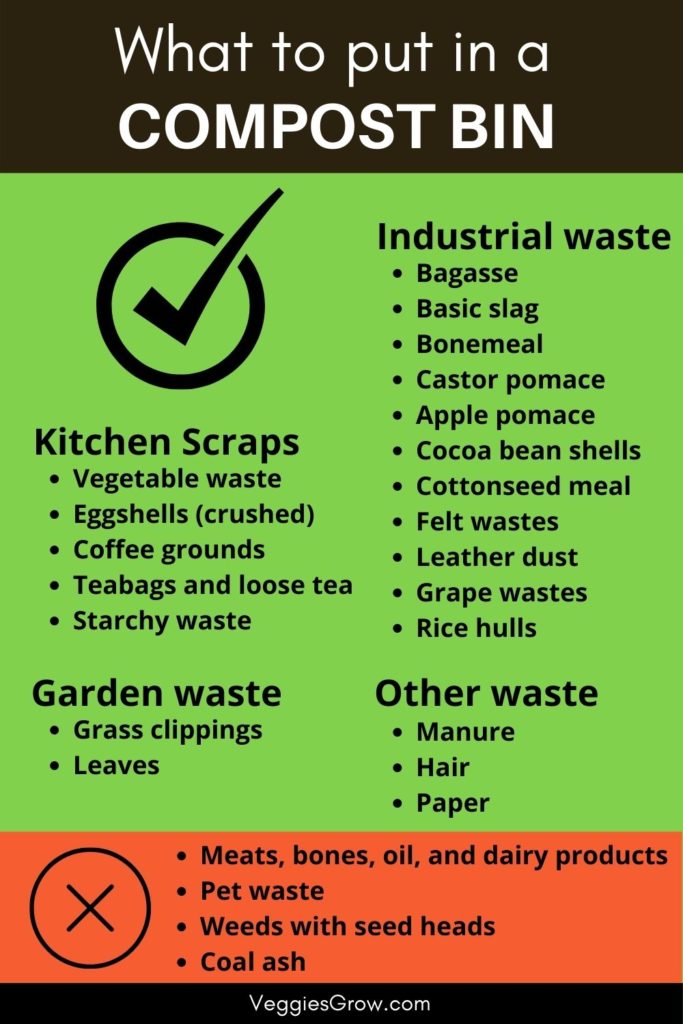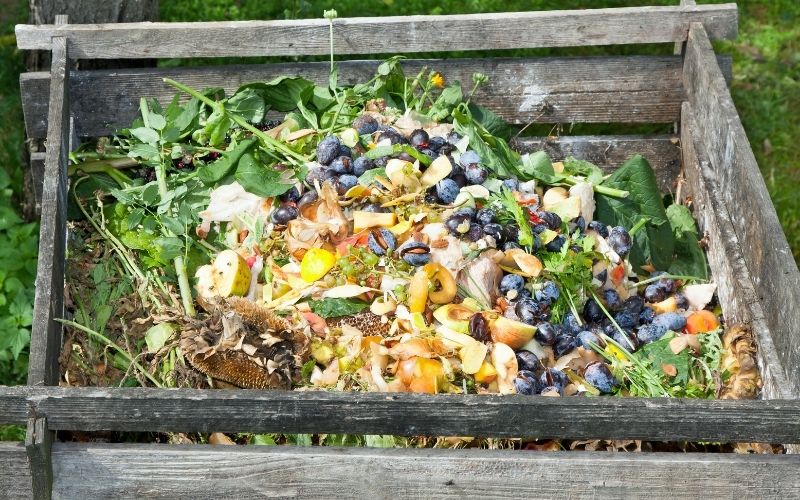Compost can be used for vegetable gardens both as a soil amendment and as a source of nutrients. It can be easily made at home at almost no cost and is an ideal environment-friendly way of recycling your food and other compostable household waste.
Composting is simple and any organic material that you add to your compost bin will eventually decay. However, adding the correct proportions of organic material in the correct form and avoiding material that will attract scavengers will make the process of composting smoother.
The composition of nutrients in your finished compost will depend on the materials you add into your compost. The two main nutrients that have to be added to your compost bin are carbon and nitrogen.
Carbon-rich materials are referred to as ‘browns’ and include dried leaves, pine needles, paper, straw, and saw dust. These materials are dry and bulky. Nitrogen-rich materials are referred to as ‘greens’ and they activate decomposition by introducing microorganisms and by acting as a source of energy for those microorganisms. “Greens” include vegetable scraps, fresh grass clippings, manure, and coffee grounds.
For best results, you should add material at a ratio of 30 parts ‘browns’ to 1 part ‘greens’ into your compost bin. A lack of nitrogen-rich ‘greens’ will result in very slow decomposition, while adding too much ‘greens’ will result in the excess nitrogen being released as ammonia gas, giving-off a foul odor.
The easiest items that you can collect and add to your compost bin will be kitchen scraps and garden waste.
Kitchen scraps mostly include parts of food items that are not eaten, such as peels, cores, seeds, vegetable stalks, eggshells, bones, coffee grounds, tea bags and loose tea, oils and fats. Given below is a list of food scraps that you should definitely try to add into your compost bin.
- Vegetable waste
The peels, cores, seeds, stalks and stems of many vegetables are usually removed and discarded before the vegetables are cooked and eaten, but also includes any vegetables that have gone moldy or too old to be used as food. Vegetable waste is an easy-to-find source of nitrogen for your compost bin.
- Eggshells
Eggshells are a common kitchen waste that does belong in the compost bin but you should make sure to crush them before adding them in. This is because eggshells take a long time to decompose. Crushing them speeds up decomposition so that the eggshells can keep up with other items in your compost bin. Eggshells don’t contain nitrogen or carbon but they will add calcium and a lot of other minerals into your compost.
- Coffee grounds
Coffee grounds are a good source of nitrogen. Although coffee grounds are acidic by themselves, they can be safely added to a compost bin. If the finished compost is slightly acidic, you can mix in some lime before applying it to your vegetable garden.
- Tea bags and loose tea
Loose tea can be directly added to the compost bin. If you are adding tea bags, you should make sure that the bag itself is fully compostable. If you are unsure if your tea bags are compostable, it will be best to empty the bags and only add the tea leaves in them into your compost. Tea leaves are also a source of nitrogen.
- Starchy waste
Cooked noodles and rice, bread, crackers and other starchy items that have gone to waste can safely be added into your compost bin. However, these items should not have been mixed with any other oils or meat products (see list of items that should not be added for an explanation). Starchy wastes are a source of carbon and can be considered as a “brown” and is ideal for balancing all other wet and nitrogen-rich kitchen scraps.
Placing a bin with a lid in your kitchen to collect suitable kitchen waste makes collecting kitchen waste for your compost bin easy. You can add stems and peels while cutting up vegetables for cooking or add cooked food that can go into a compost bin after you finish eating. Once the kitchen bin is full you can empty it into your main compost bin over a layer of carbon-rich browns.
Garden waste is also an ideal addition for your compost bin. Given below are some commonly found garden waste that should be added into your compost bin.
- Grass clippings
Fresh grass clippings are an ideal source of nitrogen for your compost bin. The amount of nitrogen they contain reduces and the amount of carbon increases as the grass clippings dry. Grass clippings decompose very fast and are ideal to speed up the decomposition process.
- Leaves
Leaves, just like grass clippings, contain more-nitrogen when green and more carbon as they dry-up. Leaves also contain a lot of minerals. Shredding leaves before adding them into your compost bin will speed-up their decomposition.
Other organic materials that you may be able to find around the house and that which you should try and add to your compost bin are:
- Manure
You should definitely add manure into your compost. If you don’t have your own source of manure, manure is easily freely available from garden centers. Manure is an ideal source of nitrogen and decomposing microorganisms.
- Hair
Hair is a nitrogen-rich source that is freely available from households. Although it may seem a little strange at first, you can save your hair that has fallen and add it to your compost bin. Chopping hair before you add it into your compost bin will make decomposition faster.
- Paper
Any type of paper can be added to your compost bin but it needs to be shredded before it is added. Paper is a source of carbon or a “brown” and needs to be mixed in with wet nitrogen-rich materials for proper decomposition.
It’s not just kitchen scraps, garden waste, and materials commonly found around the house that can be added into a compost bin. Given below is a list of industrial waste that you can add into your compost bin. Their availability will depend on the industries found in your area.
- Bagasse – plant residues from the milling of sugarcane
- Basic slag – industrial by-product formed during the smelting of iron ore to make pig iron
- Bonemeal – pulverized residue of bones that is a by-product of slaughterhouses
- Castor pomace – residue left after extracting oil from castor beans
- Apple pomace – sweet pulp residue left after pressing apples to make cider
- Cocoa bean shells – by-product of processing cocoa beans
- Cottonseed meal – residue left after oil has been extracted from cottonseed after it has been freed from its hulls
- Felt wastes – hair, wool, and felt discarded from hat factories
- Leather dust – by-product of leather processing
- Grape wastes – grape skin, seed, and stalk residues produced in wineries
- Rice hulls – waste product from rice mills
Anything that is organic, as in it was once part of a living organism, can potentially be added into a compost bin. That being said, not everything should be added into a compost bin. Given below are some items you should avoid adding to your compost bin.
- Meat, bones, oil and dairy products
These products give-off giving-off a terrible odor while decomposing and may attract flies and scavengers, including rodents.
- Pet waste
Waste from dogs, cats and birds or bedding that has been mixed with pet waste should be avoided. This is because they can carry pathogens that are harmful to humans that will not be destroyed during composting.
- Weeds with seed heads
Although weeds that have not yet gone into seed are an ideal source of nitrogen and a way of recycling nutrients in your garden, weeds with seed heads should be kept out. This is because temperatures in your compost bin may not get hot enough to destroy seeds and you would just be spreading weeds around.
- Coal ash
Wood ash is an ideal source of potassium for your compost bin that will have a liming effect on your compost, which is useful if your compost has become slightly acidic. However, coal ash shouldn’t be added into compost. This is because coal ash can contain metal and other compounds that are harmful to both plants and humans.
As you can see, there are very many things that you can find from around the house or get for free or at a very low cost from industries nearby that you can add into your compost bin. Adding a variety of these materials while keeping in mind the ratio of browns to greens, will give you the best compost for your vegetable garden within the least amount of time.
Want to refer back to this list later? Pin this to your favorite Pinterest board.


